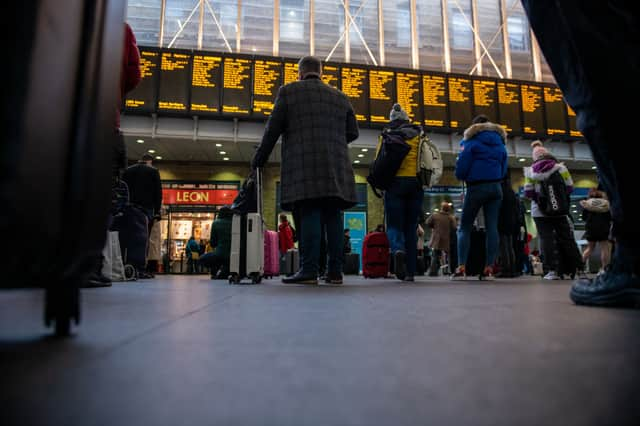Government approves massive £60m dividend for train operator with worst performance in the country


A private rail company which runs two of the UK’s worst-performing franchises was allowed to pay out a £60 million dividend last year, after it was approved by the Transport Secretary.
FirstRail Holdings paid out two dividends to its parent company FirstGroup PLC last year, despite widespread criticism and one of its franchises - Avanti West Coast - having the worst performance ranking of any operator in the UK.
Advertisement
Hide AdAdvertisement
Hide AdFive regional leaders wrote to the Transport Secretary last week calling for Transpennine Express, another of FirstRail’s franchises, to be brought into public ownership over its poor performance.
Another firm, Govia Thameslink Rail, had a dividend payment of almost £17 million signed off by the government.
RMT calls for ‘full public ownership’
The government has been criticised for allowing ailing private rail companies to payout massive dividends despite poor performance and financial support from the government to cover lost passenger revenue in the ongoing industrial dispute.
FirstRail Holdings paid out £65 million to its parent company last year, despite facing significant issues with two of the five franchises it operates and its involvement in a major industrial dispute over pay and conditions.
Advertisement
Hide AdAdvertisement
Hide AdGovia Thameslink paid a dividend of £16.9 million in October, according to its accounts, “following permission given by the Department for Transport”.
Dividend payments to franchise operators must be signed off by the Department for Transport (DfT). The department has been criticised for refusing to publish details of those approvals, over concerns about commercial confidentiality.
The nature of the agreement between the government and private rail operators means the companies’ revenues and a degree of profit are guaranteed by the government regardless of actual passenger numbers. This has meant that rail companies have not lost out as a result of the long-running industrial disputes, which union sources say means they have less incentive to negotiate a deal.
RMT General Secretary Mick Lynch said: “The DfT is now little more than a representative of big business, geared to turning tax revenue into shareholder dividends. If you’re a private train operator, it doesn’t matter whether your problem is unpredictable passenger revenue, costly train leases or industrial action, the Secretary of State is there to help, opening the public purse and emptying it into shareholder’s pockets.
Advertisement
Hide AdAdvertisement
Hide Ad"This system is not operating in the interests of passengers, railway workers or the taxpayer. It is clear that only full public ownership of train operation in this country can save our railways from being looted by this gang of unaccountable spivs.”
The payouts for both firms relate to the financial year leading up to March 2022, which is before the industrial dispute began. However, both companies have faced consistent criticism over performance in recent years.
The average cancellation rate for rail operators in the UK in the most recent period for which there is data is 3.9%, while the average on-time ratio is 62.3%, according to the Office for Rail and Road (ORR).
Avanti WestCoast, operated by FirstRail, has the worst cancellation rate of any franchise, with more than one in ten trains cancelled (10.5%) and the worst on-time ratio, of 34%. Another FirstRail franchise, Transpennine Express, has a cancellation rate of over 6%, and an on-time ratio of less than half (46.5%).
Advertisement
Hide AdAdvertisement
Hide AdGovia Thameslink achieved an on time rate slightly higher than the average, at 62.7%, but its cancellation rate was well above average, at 6.5%.
The true cancellation rate for many firms is higher than the ORR’s data would suggest, due to the practice of so-called “pre-cancellations”. Operators cancel trains the night before they’re due to run rather than on the day, and these cancellations are not factored into the ORR’s data.
Northern leaders criticise TransPennine Express
Regional leaders in the North of England have called on the government to take Transpennine Express into public ownership over concerns about its performance.
In an open letter to Transport Secretary Mark Harper, five Labour mayors said allowing Transpennine Express to continue operating would amount to “rewarding failure and be a betrayal of passengers in the north”.
Advertisement
Hide AdAdvertisement
Hide AdThey wrote: “We are of the unanimous view that TransPennine Express needs to start afresh under new ownership.
“We urge you to put the views of the passengers of the North ahead of any other considerations when making the decision on the future of TransPennine Express. Rail passengers have had enough. The Northern economy has had enough, the failure of TPE is holding us back. We need change now.”
Transpennine Express’ contract is up at the end of May, and ministers will have to decide whether to extend the contract or trigger the ‘Operator of Last Resort’ measures which will see the franchise temporarily taken into public ownership.
Comment Guidelines
National World encourages reader discussion on our stories. User feedback, insights and back-and-forth exchanges add a rich layer of context to reporting. Please review our Community Guidelines before commenting.
